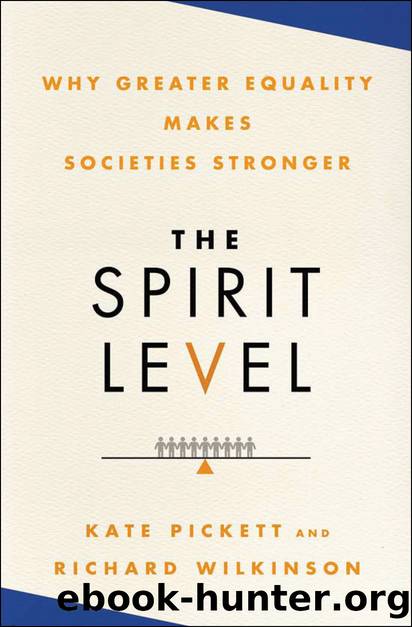The Spirit Level by Kate Pickett

Author:Kate Pickett
Language: eng
Format: epub
Publisher: Bloomsbury Publishing Plc
Published: 1999-12-31T16:00:00+00:00
MATTERS OF TASTE – AND CULTURE
So social mobility is lower and geographical segregation greater in more unequal societies. It is as if greater inequality makes the social structure of society more rigid and movement up and down the social ladder more difficult.
The work of French sociologist Pierre Bourdieu also helps us to understand how social mobility becomes more limited within more hierarchical societies.286 He describes how material differences between people, the amount of money and resources they have, become overlaid with cultural markers of social difference, which become matters of snobbery and prejudice. We all use matters of taste as marks of distinction and social class – we judge people by their accent, clothing, language, choice of reading matter, the television programmes they watch, the food they eat, the sports they play, the music they prefer, and their appreciation – or lack of it – of art.
Middle-class and upper-class people have the right accents, know how to behave in ‘polite society’, know that education can enhance their advantages. They pass all of this on to their children, so that they in turn will succeed in school and work, make good marriages, find high-paying jobs, etc. This is how elites become established and maintain their elite status.
People can use markers of distinction and class, their ‘good taste’, to maintain their position, but throughout the social hierarchy people also use discrimination and downward prejudice to prevent those below them from improving their status. Despite the modern ideology of equality of opportunity, these matters of taste and class still keep people in their place – stopping them from believing they can better their position and sapping their confidence if they try. The experiments on stereotype threat described in Chapter 8 show how strong the effects on performance can be. Bourdieu calls the actions by which the elite maintain their distinction symbolic violence; we might just as easily call them discrimination and snobbery. Although racial prejudice is widely condemned, class prejudice is, despite the similarities, rarely mentioned.
These social systems of taste, which define what is highbrow and cultured, and what is lowbrow or popular, constantly shift in content but are always with us. The examples that Bourdieu collected in the 1960s seem very dated now, but illustrate the point. He found that different social class groups preferred different types of music; the lower social class groups preferred the catchy tune of the ‘Blue Danube’, while the upper classes expressed a preference for the more ‘difficult’ ‘Well-Tempered Clavier’. The upper classes preferred abstract art and experimental novels, while the lower classes liked representational pictures and a good plot. But if everybody starts to enjoy Bach and Picasso and James Joyce, then upper-class taste will shift to appreciate something new – elitism is maintained by shifting the boundaries. What Bourdieu is describing is an ‘economy of cultural goods’, and inequalities in that economy affect people almost as profoundly as inequalities in income.
In her book, Watching the English, anthropologist Kate Fox describes the social class markers of the English – in conversation, homes, cars, clothes, food and more.
Download
This site does not store any files on its server. We only index and link to content provided by other sites. Please contact the content providers to delete copyright contents if any and email us, we'll remove relevant links or contents immediately.
The Secret History by Donna Tartt(19088)
The Social Justice Warrior Handbook by Lisa De Pasquale(12190)
Thirteen Reasons Why by Jay Asher(8910)
This Is How You Lose Her by Junot Diaz(6887)
Weapons of Math Destruction by Cathy O'Neil(6280)
Zero to One by Peter Thiel(5802)
Beartown by Fredrik Backman(5754)
The Myth of the Strong Leader by Archie Brown(5507)
The Fire Next Time by James Baldwin(5446)
How Democracies Die by Steven Levitsky & Daniel Ziblatt(5219)
Promise Me, Dad by Joe Biden(5153)
Stone's Rules by Roger Stone(5088)
A Higher Loyalty: Truth, Lies, and Leadership by James Comey(4964)
100 Deadly Skills by Clint Emerson(4925)
Rise and Kill First by Ronen Bergman(4789)
Secrecy World by Jake Bernstein(4753)
The David Icke Guide to the Global Conspiracy (and how to end it) by David Icke(4720)
The Farm by Tom Rob Smith(4512)
The Doomsday Machine by Daniel Ellsberg(4490)
